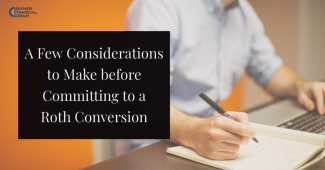
A Few Considerations to Make before Committing to a Roth Conversion
There are many perfectly valid reasons why you may be considering converting your traditional IRA to a Roth IRA. The most obvious being the numerous tax advantages you’ll receive later down the line. Although the draw of contributing a post-tax distribution may be appealing and the best financial decision for you to make, there are a few considerations you may want to weigh before committing to the decision to convert.
Which tax bracket are you in now, and which one will you be in, in the future?
Even if you’re in a higher tax bracket in your working years, this doesn’t necessarily mean you’ll stay in the same bracket in your retirement. Staying in a traditional IRA if you think you’ll be in a lower tax bracket in your later years means you can make larger contributions to your account now and save on taxes as you drop into a lower bracket later. You should also consider where you’re planning on retiring. Some states allow for the protection of a certain amount of assets, while others do not. Look into whether or not your state allows for these protections and if they do, you may save more money just by staying with a traditional account. Remember that everyone has access to lower tax brackets with their IRA RMDs. Income from these contributions may be pushed into these lower brackets to potentially save you money, but remember if they are not used you won’t save.
Your Financial Needs Now and Later
Can you safely say that you’ll not need the money from contributions in the next couple of years? If you think you’ll need the money for certain oncoming and foreseeable expenses, then you should reconsider making a Roth conversion. If you have to withdraw money from your Roth account before a five-year period has elapsed, then you may be penalized or more heavily taxed depending on your age and the time of the withdrawal. If you think that you’ll have a lot of medical expenses later or a preexisting medical condition now, then you should consider staying in a traditional IRA. Medical deductions work in favor of these accounts as they are made prior to taxes. If you’ve already made a Roth conversion, the money that is lost in taxes is gone forever and cannot be used to help absorb future medical costs associated with old age.
Your Past, Current, and Future Employment Status
A small but important consideration to make before deciding to commit to a Roth conversion is whether you are, have been, or are planning on being a business owner. Any losses on a personal business can later be used against the money you have in your account. Pretax contributions may help absorb these later penalties if your business suffers an unfortunate loss.
Who your Money is going to and the Size of your Estate
If you’re planning on donating a portion of your IRA to a charity of your choice, then staying with a traditional IRA is in your best interest. Charities and other nonprofits are exempt from taxes when receiving money from an IRA account. Donations made from a traditional IRA will potentially be larger than from a Roth account, and charities will be able to keep and use whatever assets they receive from these accounts. If you plan on giving money from this account to a non-spouse beneficiary in a lower tax bracket, staying in a traditional IRA will often work better in both your favor. The final consideration to make is the size of your estate and your local tax system. If your estate is worth less than five million dollars then you may not be saving on your federal taxes, but if your state tax is relatively high a Roth IRA would definitely work in your favor.
The temptation of committing to a Roth IRA is undoubtedly compelling and a perfectly viable option for many people to consider these factors as well as others and consult with an advisor before making the choice.
*This content is developed from sources believed to be providing accurate information. The information provided is not written or intended as tax or legal advice and may not be relied on for purposes of avoiding any Federal tax penalties. Individuals are encouraged to seek advice from their own tax or legal counsel. Individuals involved in the estate planning process should work with an estate planning team, including their own personal legal or tax counsel. Neither the information presented nor any opinion expressed constitutes a representation by us of a specific investment or the purchase or sale of any securities. Asset allocation and diversification do not ensure a profit or protect against loss in declining markets. This material was developed and produced by Advisor Websites to provide information on a topic that may be of interest. Copyright 2021 Advisor Websites.

